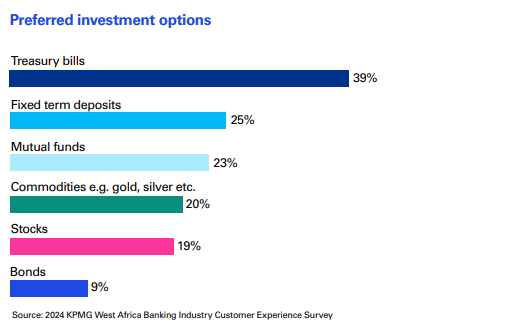The 2024 KPMG Customer Experience Survey has indicated that the investment environment in Ghana demonstrates a cautious approach, with a focus on both low and medium risk opportunities.
This cautious approach is evident as individuals seek to manage economic difficulties while striving for financial security and independence.
According to the report, the recent insights revealed that treasury bills remain the most preferred investment option, with 39 per cent of respondents opting for these low-risk instruments.
Fixed or term deposits closely follow at 25 per cent, further reinforcing the cautious approach among many Ghanaians who prioritise stability and guaranteed returns amidst economic uncertainty.
However, the report said there were signs of gradual diversification in investment choices.
Mutual funds, selected by 23 per cent of respondents, are gaining traction as a medium-risk option offering balanced returns.
Additionally, commodities such as precious metals and agriculture products, accounted for 20 per cent, which demonstrated a growing appetite for alternative investments as a hedge against inflation and economic instability.
Expectedly, higher-risk instruments such as stocks (19 per cent) and bonds (9 per cent) remain underutilised, pointing to limited confidence.
The report added that the hesitancy of Ghanaians to adopt these investment options highlights the need for banks to provide education and solutions to bridge knowledge gaps and demystify complex financial products.
Despite these trends, the survey also revealed that 34 per cent of respondents were willing to take risks with their investments, signalling an underlying desire for wealth creation and financial independence.
These challenges, notwithstanding, the survey also highlighted how Ghanaians were channelling resources toward personal growth, financial security and family welfare.
When asked about their top three priorities, approximately 24 per cent of respondents are investing in skill acquisition and business ventures, reflecting a desire for career advancement and financial independence.
Family obligations remained a central priority, with 24 per cent dedicating funds to education, healthcare and general welfare.
Similarly, wealth generation through investments and property sales also gained traction, with 22 per cent of respondents pursuing these strategies.
BY TIMES REPORTER
